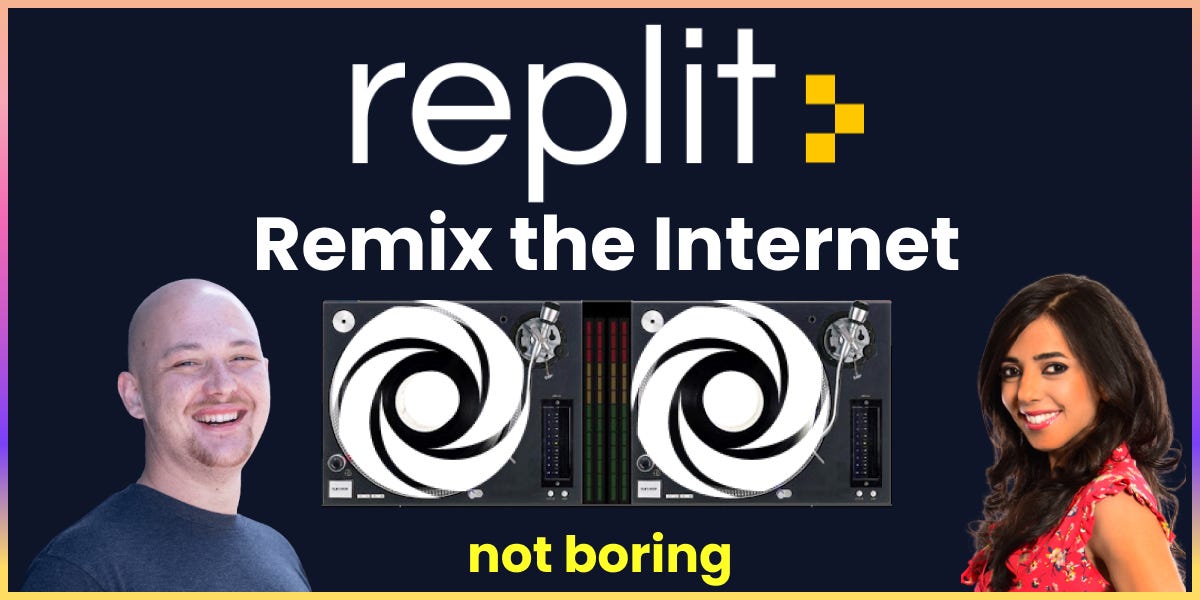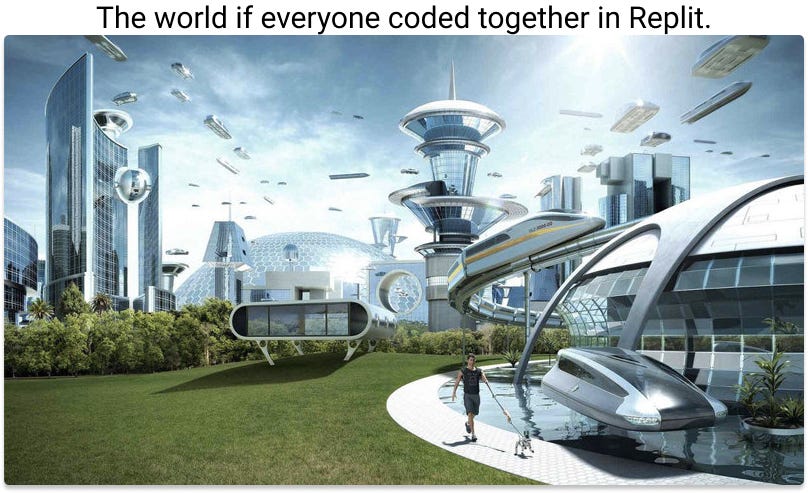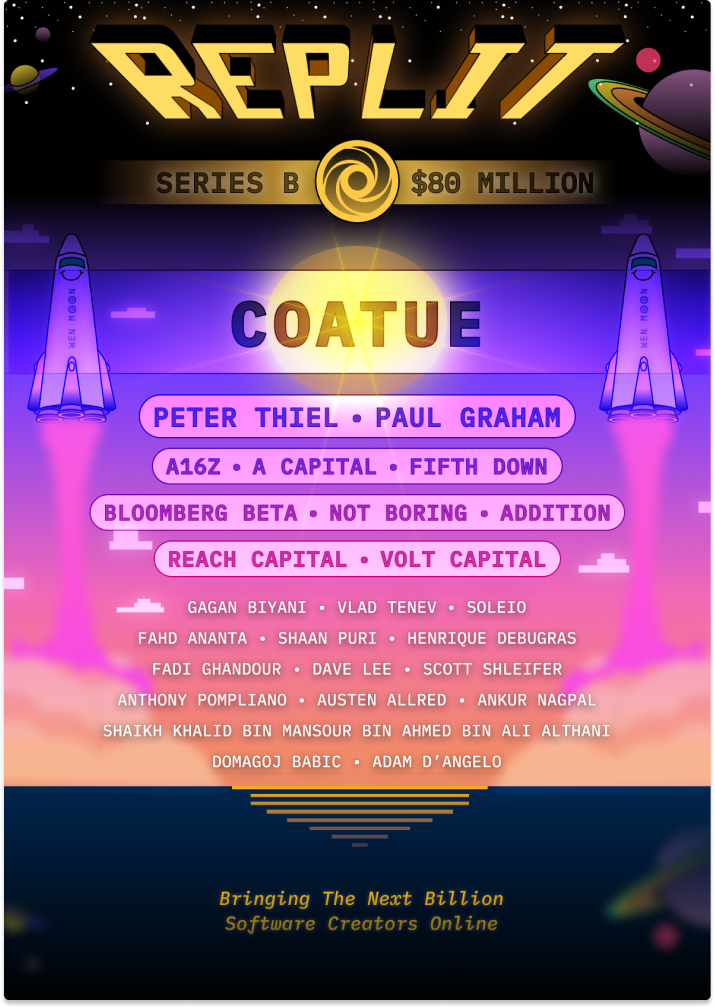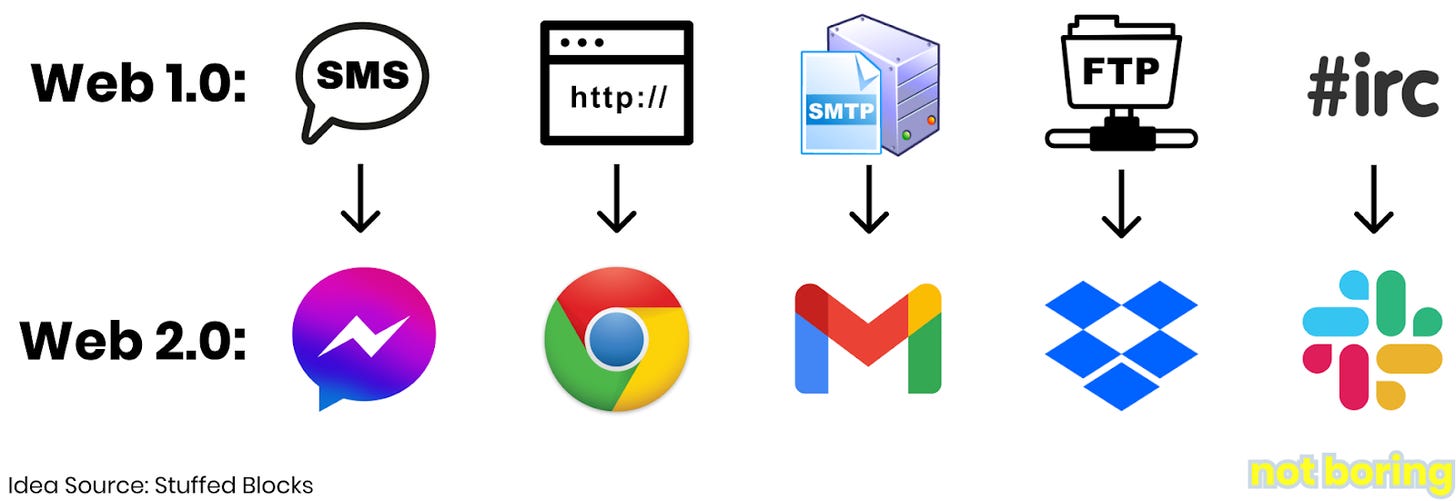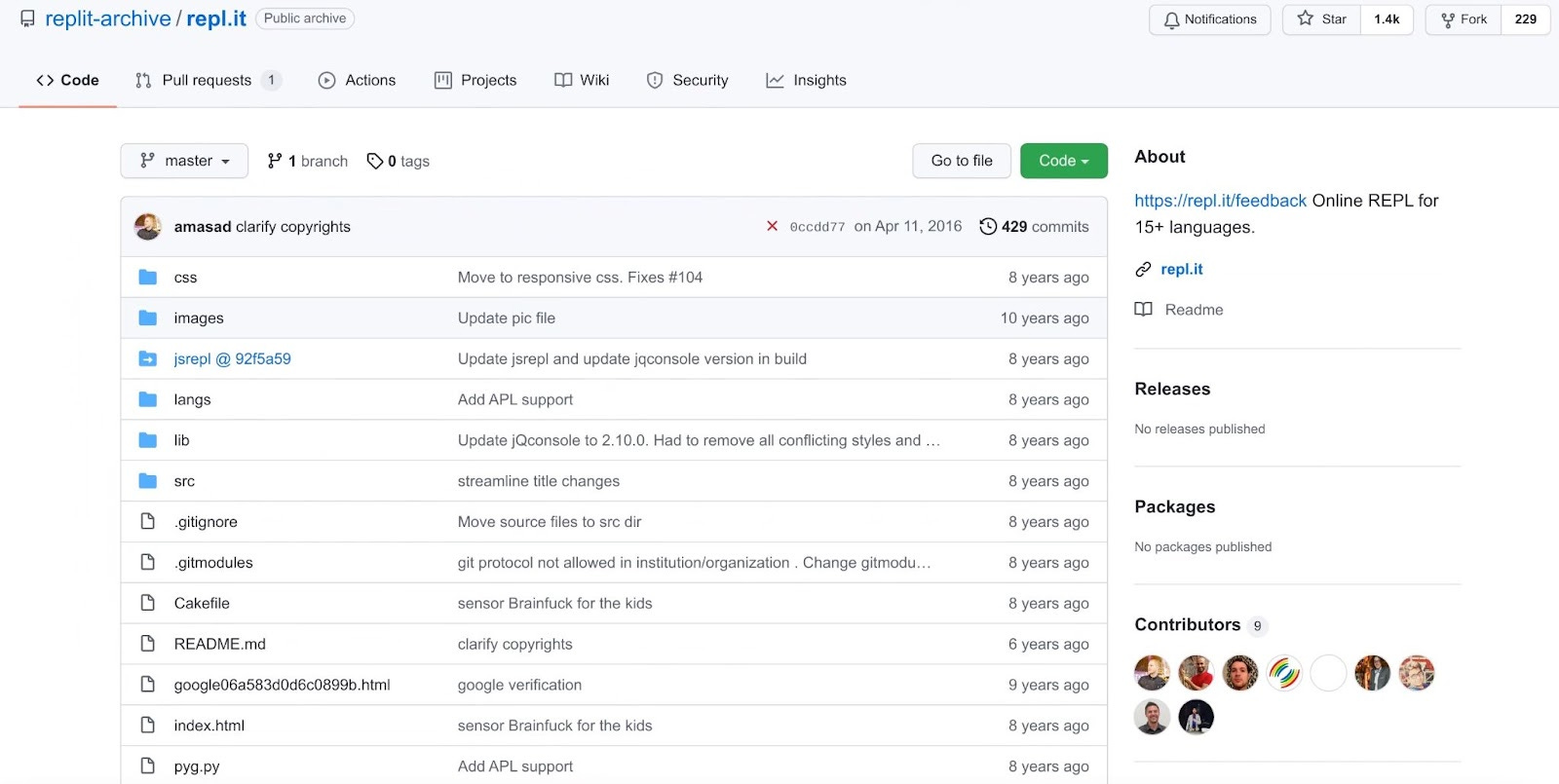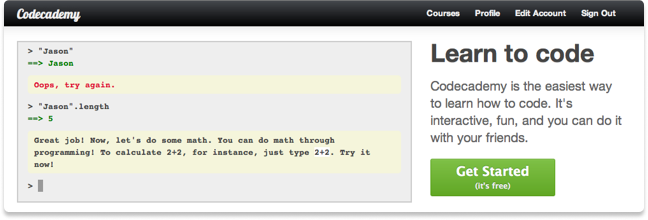Not Boring by Packy McCormick - Replit: Remix the Internet
Replit: Remix the InternetReplit Raises $80M Series B to Bring the Next Billion Software Creators OnlineWelcome to the 1,010 newly Not Boring people who have joined us since Monday! Join 91,940 smart, curious folks by subscribing here: Hi friends 👋, Happy Thursday! I’ve been excited to write today’s piece since I first met Amjad Masad, Replit’s founder, back in July. The more I’ve dug in since then, the giddier I’ve gotten. The post is a Sponsored Deep Dive x Investment Memo. You can read my Sponsored Deep Dive thought process here, but the TL;DR is: I only write about companies I would invest in, and in this case, Not Boring Capital invested in Replit’s Series B. I genuinely believe that Replit could become one of the most impactful and important companies in the world. It might be hard to see it today — it looks like a toy — but Replit has the potential to make the internet read-write-remix, spread code literacy, and give a billion people the chance to build businesses online. Let’s get to it. Replit: Remix the Internet// I’ve started and restarted this essay more times than any I’ve ever written. It’s a tough one. It’s hard to capture the full breadth of what Replit is trying to build, and how, and what the world will look like if they succeed. That’s partially because it’s impossible to predict, because Replit is in the primitives business. It’s laying the foundation on top of which one billion people will build the future. After spending hours and hours researching, talking to Replit’s CEO Amjad Masad, and writing this piece, I’m convinced that Replit has the potential to be one of the most valuable and impactful companies in the world. But I probably need to explain why, and to do that, I need to just pick a place to start and get going. So let’s start here. Everyone’s first line of code has to be written in Replit. Replit’s mission is to bring the next billion software creators online and accelerate a shift towards a world where the combination of software and the internet is truly The Great Equalizer. The company believes that in the modern world, the ability to write code should be as ubiquitous as the ability to write essays. It wants to lead the transition from a stacked model of software creation to a networked one, and to create the world’s first massively distributed and collaborative operating system. Replit’s vision is mind-achingly enormous, like the “the world if…” meme brought to life: But when you’re setting out to build something as big as Replit wants to become, you need to start with a clear and ambitious proximate objective, something to tackle right now. That’s why Replit wants to be the first place that anyone writes a line of code. Then it can become the first place they build an app, the first place they collaborate on software, the first place they make money online, and ultimately, the place that they turn whenever they want to create software. It’s a straightforward goal with nuanced implications. For example, it means not targeting experienced developers to start, even though they’re the more valuable users today. If they’ve already written their first line of code elsewhere, they definitionally can’t write their first line of code in Replit. It also means that Replit needs to make it really easy to get started by putting everything you need to code something simple in one place, accessible from anywhere in the world with an internet connection whether you’re on a brand new MacBook Pro, a Chromebook, or even an Android phone. And it means making it multiplayer from the beginning, to create a modern development experience that includes collaboration, like people are used to with products like Google Docs and Figma. A networked operating system demands networked development. The approach comes with trade-offs. As it stands today, a large company couldn’t build most of its software in Replit. It’s more limited than a local setup including best-in-class point-solutions like Microsoft’s VS Code, Github, Heroku, Docker, AWS, npm, and postgres. It’s slower. It’s not industrial-grade. But that’s not the point. Replit wants to build the future, and to build the future, you don’t rebuild the old thing for the old customers. You build something new that starts out looking like a toy, and you build for the underserved, not just for moral reasons, but for strategic ones. It’s disruptive innovation meets the compounding power of young users. It’s more Roblox than Github. As Replit’s CEO and co-founder Amjad Masad explained it to me:
Partnering and growing with underserved (here: young) customers requires an uncommon patience and focus on the mission. Replit is already a decade old if you count its earliest instantiation as repl.it, an open source project that Amjad built growing up in Jordan. That project led him to Codecademy and Facebook before returning to the original mission and rebooting Replit as a company in 2016. Today, Replit, Inc. is in year five of a multi-decade plan. That plan starts with becoming the first place that everyone writes code, and growing with them symbiotically as they grow. That means giving new software creators everything they need to start creating, accessible from anywhere to anyone with a laptop, tablet, or phone. It ends with Replit becoming the world’s first massively distributed and collaborative operating system, an open and extensible platform that anyone can build on top of and plug into to improve the platform itself, and make money by doing so. The more people who know how to code, the more people there are to improve the platform, the richer the ecosystem becomes. It’s a strongly positive sum network effect. When Replit is successful, everyone will be able to remix the internet. Because of the emergent nature of composability, it’s impossible to predict what Replit will look like in a decade, but it’s not impossible to predict that the results are going to be special. If the company gets everything just right, I think that it has the chance to be a $100 billion+ company that reshapes the way that software is developed and by whom, and by extension, who can build the internet. It’s a multi-decade vision, and building towards it is going to take a lot of time, money, and smart people. That’s why today, Replit is announcing an $80M Series B led by Coatue at an $800M valuation. Actually, I’m just going to call it: Replit will be a $100 billion+ company, but more importantly, its users will generate multiples of that number in value for themselves. Not Boring Capital invested in this round and I couldn’t be more pumped. Replit embodies so many of the themes and ideas that we talk about in Not Boring -- composability, decentralization, disruptive innovation, the compounding power of young users, web3, and more -- and it’s building a future I want to see exist. To understand the company’s enormous potential requires projecting the course of each of those themes forward and where they might interact, and then weaving together those different strands into one coherent narrative. Honestly, it’s been one of the hardest pieces for me to write because each thread I pull opens up new paths for exploration, a new “most exciting thing” to elucidate. So maybe we fast-forward to the end for a second. Imagine this: a world in which anyone, anywhere can learn to code, snap together composable services on top of a shared data and compute layer to build products, and monetize those products instantly and continuously, all in the same place. Where everyone can manipulate code like we manipulate words, creating as much richness and novelty in the programs we use as in the books and essays we read. We’re going to go down a winding path to get to that world, and I hope I can do it justice. Join me as we explore:
Before we get to Replit’s story, we need to talk about what’s at stake. The Internet Wants to be OpenIt shouldn’t be surprising that the internet is run by large, centralized companies today. Honestly, our fault. The early internet, from the 1980s to the early 2000s, was largely open and decentralized. It was built on top of a series of open protocols that anyone could build directly on top of, like HTTP for websites, SMTP for email, SMS for messaging, IRC for chat, and FTP for file transfer. The benefit was that these protocols were generally agreed upon and not subject to change; I could build a website on HTTP and if people had my website address, they could go directly to my site, not intermediated by anyone else. But there were some major challenges, which I covered in The Value Chain of the Open Metaverse:
Web 2.0 (mid-2000s to present) emerged as entrepreneurs recognized the holes in Web 1.0 and built products to fill them in, and capture the value in the process. These companies didn’t just capture state, they aggregated it, building up huge troves of valuable user data. They made it so that anyone could participate and build a presence -- think about how easy it is to set up a Facebook page versus coding a website. They wrapped existing protocols in frictionless user interfaces and created de facto products where no protocols existed. We’ve covered some of the challenges with Web 2.0 in Not Boring, along with some of the ways that web3 might help solve them. In many ways, web3 is Web 1.0 with most of the holes filled:
But one thing that still hasn’t been solved is that most of us aren’t technical enough to actually create software. Fewer than 30 million people in the world know how to code. Anyone can now own the protocols and apps they use, but most of us (certainly me included) still can’t build them, or build on top of them. A truly open, decentralized internet will be one that a billion people can build on and remix and compose, where anyone can interact directly with protocols, APIs, and services, and build protocols, APIs, and services themselves. It will be a world in which people can design their own internet experience, and design software that can succeed not by being 10x better than the existing solutions or 10x bigger than competitors, but by better serving the millions of small niches that make up the internet. The commonly way to describe the evolution of the internet is as follows:
Ownership is a critical piece, but it kinda breaks the read-write metaphor. The thing that prevents centralization ultimately will be how many people are able to create unmediated homes on the internet directly on top of protocols and shared state. People should be able to fork and build and tinker and tweak to build their own experiences on top of global, decentralized databases. When that happens… Web3 will be read-write-remix. When I wrote that on Monday, I had Replit in mind. We’ll talk more about that world in a bit, but I wanted to set the stage with what’s at stake. For now, let’s go back to the beginning of the story, when Replit was born of a pressing need felt by a young Jordanian hacker. From Jordan to ReplitIt’s possible that only Amjad Masad could have built Replit. His combination of technical skills and lived experience might be exactly what’s required to reimagine who gets to create and monetize software, and how, in a world in which talent is equally distributed but opportunity is not, yet. Amjad’s story proves two things:
Amjad Masad was born in Amman, Jordan. When he was very young, his dad, who was working two full-time jobs, running his own business after coming home from his 9-5 job, bought the family its first computer. Back then, even getting a computer running required a little bit of basic (pun intended) programming, guided by a thick instruction manual, and young Amjad learned as his dad did. Amjad’s childhood looked a lot like Replit’s product roadmap. By age six, he could do some light programming. By age 12, he was programming in Visual Basic. By age 15, he sold his first piece of software, a LAN gaming center management software, and started a small business to maintain the computers and games at the stores that bought it. In high school, he walked a familiar hacker’s path: originally guided by a teacher who gave him advanced lessons in math and computer science on the side, Amjad became bored and unruly when the teacher left the school and the lessons stopped. His parents made frequent trips to the principal’s office to bail him out. But he was smart, and he escaped high school. For college, Amjad went to Princess Sumaya University for Technology (PSUT), where he once again found himself understimulated and underperforming. According to a 2013 profile, he was dropped from the same calculus class twice, not because he wasn’t good at math, but because he never showed up. Instead, he was spending his time coding for startups and bigger companies, and hacking on the earliest version of what would become repl.it. But he did want to graduate, so to prove his merit, he did what anyone would do: he hacked into the university’s network and exposed vulnerabilities to the administration. Instead of kicking him out, they offered him a deal: work with the IT team to rebuild the network’s architecture and security, stay in school. Finally, after six tedious and soul-crushing years, he graduated in 2010 and went to work for Yahoo!, which, you guessed it, was tedious and soul-crushing work to a creative hacker like Amjad. This time, to keep his brain occupied, he started trying to learn a bunch of different programming languages. Only problem was, Amjad didn’t own a computer, so after work, he would go to internet cafes, where each night, he had to set up his programming environment from scratch, all while he was paying for computer time. Worse, he couldn’t save his progress, so each time, he had to restart, which slowed down his progress even further. He told Japanese blog gihyo:
Google Docs had recently come out, making it easy to write and collaborate in the browser (yes, there was a time in recent history when that wasn’t a thing), and Amjad wanted something similar for code. It didn’t exist, so once again, he did the most hacker thing he could: he built a solution. He teamed up with classmate Max Shawabkeh and future wife/co-founder Haya Odeh to build a program that could support cloud-based programming environments from a web browser. He didn’t need a full-fledged integrated development environment (IDE), just something to play around with and learn on, like the interactive REPLs he’d learned about studying SCHEME, a LISP dialect taught to first-year MIT computer science students. So they built repl.it, and open sourced the project. Meanwhile, across the ocean in New York City, two young Columbia grads, Zach Sims and Ryan Bubinski, discovered the project on Github and realized that the interactive, web-based programming environment Amjad built would be perfect for the coding education startup they were building: Codecademy. Within two days of launch in August 2011, Codecademy signed up 200,000 users, which meant that 200,000 people around the world were suddenly using the code that Amjad had built in internet cafes in Jordan. A month later, Zach and Ryan emailed Amjad asking him to collaborate. Amjad was already planning to quit Yahoo! to build his own business on top of repl.it, but the idea of joining forces was appealing:
The trio worked on projects for a month, and in November, Zach flew to Jordan to convince Amjad to move to New York and work with them as a founding engineer at Codecademy. They went back and forth, debating equity, and as they drove Zach back to the airport, Amjad told him that he wouldn’t make the leap at the lower equity package Zach was offering. So in the taxi, Zach upped the offer, Amjad signed, and in January 2012, he moved to New York. After two years building Codecademy, during which the company raised a $10 million Series B from investors including Index, Union Square Ventures, Richard Branson, and Alexis Ohanion, Amjad decided that if he was going to live halfway around the world, he wanted to live in the home of hacker culture: Silicon Valley. He left Codecademy and headed west before figuring out his next stop, and quickly landed a job at Facebook. He was attracted to the company by its strong engineering culture, but was specifically drawn to internet.org, the company’s project to bring internet access to less developed countries. It was another clear step in Amjad’s personal quest to bring the power of software to more people around the world. But the way Facebook works, you get hired by the company, and then interview with teams inside of the company. And the internet.org team didn’t have room for Amjad. But at the same time, a small team at Facebook was working on building a new open source framework that would make it easier for engineers to create software for mobile: React Native. Amjad joined that team as a founding engineer, and spent nearly three years building it out. The beauty of React Native is that it lets developers write code in React, a best-in-class JavaScript library, that automatically works across platforms. That means that small companies might not need an iOS team and an Android team and teams for the long-tail of platforms. One mobile team shares the same codebase, and React renders the code to the native platform’s UI. One entrepreneur I spoke to this week brought up React Native unprompted, saying, “With tools like AWS, React Native, and more, we can do an enormous amount with a team of 10 people.” All the while, while Amjad was working towards his personal mission of making coding more accessible at Codecademy and Facebook, repl.it continued to grow in the background. Still, no one had built the product that he had thought about building back in 2011 on top of it. As he wrote in 2018:
So did he start it? And if so, what is Replit? How is it riding the compounding power of young users? Will it embrace web3? Could it build the operating system for the 21st Century? The answer to all of these and more if you… How did you like this week’s Not Boring? Your feedback helps me make this great. Loved | Great | Good | Meh | Bad Thanks for reading and see you on Monday, Packy If you liked this post from Not Boring by Packy McCormick, why not share it? |
Older messages
The Pareto Funtier
Monday, December 6, 2021
More fun making money, and more money having fun
Idea Legos
Monday, November 22, 2021
Ideas compound and compose just like interest and software
Stytch: Kill the Password
Thursday, November 18, 2021
Announcing the Newest API-First Unicorn Saving the Internet
Let's Buy the US Constitution
Monday, November 15, 2021
ConstitutionDAO, web3, and America
Modern Treasury: The Quadrillion $ Quest
Thursday, November 11, 2021
The $2 billion, 3-year-old Startup Modernizing Money Movement
You Might Also Like
🔮 $320B investments by Meta, Amazon, & Google!
Friday, February 14, 2025
🧠 AI is exploding already!
✍🏼 Why founders are using Playbookz
Friday, February 14, 2025
Busy founders are using Playbookz build ultra profitable personal brands
Is AI going to help or hurt your SEO?
Friday, February 14, 2025
Everyone is talking about how AI is changing SEO, but what you should be asking is how you can change your SEO game with AI. Join me and my team on Tuesday, February 18, for a live webinar where we
Our marketing playbook revealed
Friday, February 14, 2025
Today's Guide to the Marketing Jungle from Social Media Examiner... Presented by social-media-marketing-world-logo It's National Cribbage Day, Reader... Don't get skunked! In today's
Connect one-on-one with programmatic marketing leaders
Friday, February 14, 2025
Enhanced networking at Digiday events
Outsmart Your SaaS Competitors with These SEO Strategies 🚀
Friday, February 14, 2025
SEO Tip #76
Temu and Shein's Dominance Is Over [Roundup]
Friday, February 14, 2025
Hey Reader, Is the removal of the de minimis threshold a win for e-commerce sellers? With Chinese marketplaces like Shein and Temu taking advantage of this threshold, does the removal mean consumers
"Agencies are dying."
Friday, February 14, 2025
What this means for your agency and how to navigate the shift ͏ ͏ ͏ ͏ ͏ ͏ ͏ ͏ ͏ ͏ ͏ ͏ ͏ ͏ ͏ ͏ ͏ ͏ ͏ ͏ ͏ ͏ ͏ ͏ ͏ ͏ ͏ ͏ ͏ ͏ ͏ ͏ ͏ ͏ ͏ ͏ ͏ ͏ ͏ ͏ ͏ ͏ ͏ ͏ ͏ ͏
Is GEO replacing SEO?
Friday, February 14, 2025
Generative Engine Optimization (GEO) is here, and Search Engine Optimization (SEO) is under threat. But what is GEO? What does it involve? And what is in store for businesses that rely on SEO to drive
🌁#87: Why DeepResearch Should Be Your New Hire
Friday, February 14, 2025
– this new agent from OpenAI is mind blowing and – I can't believe I say that – worth $200/month
